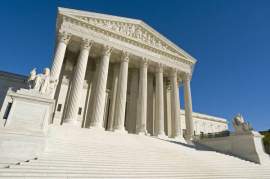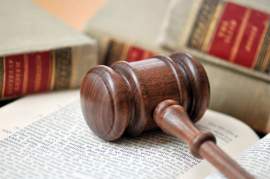
Declaration of the Rights of Man

Popular In Constitution
Purpose Of Lifetime Appointment And Pros And Cons Enumerated Powers Bicameral Legislature Background Article 3 Of The Constitution We The People 1st Amendment Who Wrote The Constitution Judicial Review Equal Protection Clause Three Fifths Compromise 10th Amendment 5th Amendment
What is the Declaration of the Rights of Man?
The Declaration of the Rights of Man was on of the most fundamental documents of the French Revolution. The Declaration of the Rights of Man was drafted over a period of 6 days between August 20th and August 26th, 1789 by the National Assembly of France. The Declaration of the Rights of Man was, like the Declaration of Independence in the American Colonies, a statement to the aristocracy of the publics disdain for specific policies and would eventually become the essence of the preamble to the Constitution of 1791.
The Declaration of the Rights of Man was drafted by the Marquis de Lafayette and was strongly influenced by the theories of the social contract and individualism espoused by Jean-Jacques Rousseau as well as the separation of powers theory discussed by Baron de Montesquieu. The Declaration of the Rights of Man was heavily influenced by the Virginia Declaration of Rights as well as the Dutch Patriot Movement.
The Declaration of the Rights of Man were written as a direct refutation of the laws and policies of the aristocratic regimes of the past. Popular sovereignty was to replace “divine right.” The Declaration of the Rights of Man also had the goal of granting individuals the “natural, inalienable and sacred human rights” including “freedom, property, safety and the right to resist oppression.”
Articles of the Declaration of the Rights of Man
The articles of the Declaration of the Rights of Man consists of 17 articles that cover a number of topics. Articles 1, 2 and 17 specifically refer to an individuals rights to be free from government intrusion and to be secure in their life, liberty, and property. The specific provisions of these Articles are:
Article 1 - All people shall have equal rights upon birth and ever after. General utility is the only permissible basis for social distinctions.
(This article was specifically designed to do away with the social, and economic, benefits that came with being born into a specific class. Where the Declaration of the Rights of Man made it a point to define the rights of all citizens it did not include women and there is no mention of slavery.)
Article 2 - The aim of all political associations shall be to preserve man's natural and imprescriptible rights. These are the right to freedom, property, safety and the right to resist oppression.
(When referring to the rights of man the Declaration of the Rights of man only applied to landowning men who were 25 years or older and paid taxes equal to 3 days worth of work and were not servants. This essentially gave the right to be an “active citizen” to only 4.5 million out of 29 million citizens. It was not until the 1940’s that the rights of “active citizens” were granted to women.)
Article 17 - The right of ownership is an inviolable and sacred right; one may not be deprived of one's property, unless where public need, duly ascertained by law, clearly requires it, and subject to the condition that fair and prior compensation be made.
Articles 3 thru 6 of the Declaration of the Rights of man were drafted concerning the government, especially the legislature, its power; how it should be created and how it may be permitted to influence the public.
Article 3 - The principle of all sovereignty resides in the Nation. No body or individual may exercise any power other than that expressly emanating from the Nation.
Article 4 - Freedom is the power to do anything which does not harm another: therefore, the only limits to the exercise of each person's natural rights are those which ensure that the other members of the community enjoy those same rights. Legislation only may set these limits.
(Article 4 of the Declaration of the Rights of Man was specifically written to combat the practices of the aristocracy by which individuals would be arrested and charged with criminal conduct that was not prescribed by law.)
Article 5 - Only actions harmful to the community may be made illegal. No-one may be prevented from doing that which the law does not forbid, nor be forced to do that which the law does not command.
Article 6- Legislation expresses the overall will. All citizens, either in person or through their representatives, are entitled to contribute to its formation. Legislation must be the same for all, whether it serves to protect or to punish. As all citizens are equal in the eye of the law, positions of high rank, public office and employment are open to all on an equal basis according to ability and without any distinction other than that based on their merit or skill.
(Article 6 of the Declaration of The Rights of Man specifically attacks the nature of the French government as it then stood in 1789. Where the King was the sole legislative body in the government. Article 6 specifically calls for a legislative body represented by, and elected by, the people. Article 6 of the Declaration of the Rights of Man also provides for access to public office positions and employment by all active citizens based on merit; unlike the croniism that was prevalent under the aristocracy.)
Articles 7 thru 9 are designed strictly to create rights of individuals to be free from unwarranted seizure of their person or property without justification, akin to the 4th Amendment in the United States.
Article 7 - A person may be accused, arrested or detained only in the cases specified by law and in accordance with the procedures which the law provides. Those who solicit, forward, carry out or have arbitrary orders carried out shall be punished; however, any citizen summoned or apprehended pursuant to law must obey forthwith; by resisting, he admits his guilt.
(Article 7 of the Declaration of the Rights of Man was meant to directly attack the policy of arresting members of the public for arbitrary reasons. It requires that all members of the public be informed of the laws of which they are required to follow.)
Article 8 - Only penalties which are strictly and clearly necessary may be established by law, and no-one may be punished other than pursuant to a law established and enacted prior to the offence, and applied lawfully.
Article 9 - As all persons are presumed innocent until declared guilty, force used in making indispensable arrests which exceeds that needed, shall be severely punished by law.
Articles 10 and 11 of the Declaration of the Rights of Man were written to address the prohibitive nature of the government in preventing the freedom of speech, religion, and the press. Much like the 1st Amendment in the United States Constitution’s Bill of Rights, Articles 10 and 11 address the right of every individual to be vocal about the government and be able to express their freedom of religion.
Article 10 - No-one may be troubled due to his opinions, whether or not they are on religious issues provided that the expression of these opinions does not disturb the peace.
Article 11 - Free communication of ideas and opinions is one of the most precious human rights; all citizens may therefore speak, write and print freely, though they may be required to answer for abusing this right in cases specified by law.
Article 12 - The protection of the rights of man and the citizen requires a police force; consequently this force is established in the interest of all, not in that of those to whom it has been entrusted.
(Article 12 of the Declaration of the Rights of Man focuses on the protection of citizens of France from abusive police conduct. It is much akin to the United States Constitution’s third and fourth Amendments. It focuses on the idea that the police are representatives of the citizenry and should not act arbitrarily or at the will of the government.)
Articles 13 and 14 of the Declaration of the Rights of Man focus primarily on the issue of taxation. Article 13 specifically calls for all the active citizens to contribute to public resources, especially for law enforcement. Article 14 proscribes that all active citizens may contribute to the creation of the tax code either by through their own involvement in the government or through their elected representatives. This is the equivalent of “no taxation without representation” in the United States.
Article 13- The maintenance of the police force and administration expenses require public contributions. These contributions are to be borne by the citizens equally according to their resources.
Article 14 - All citizens have the right, either in person or through their representatives, to ascertain the need for the public contributions, to freely authorize these contributions, to monitor their use, and to determine the amount, basis, collection and duration of contributions.
Article 15 - The community has the right to ask any public officer to account for his service.
Article 16 - Any society in which rights are not guaranteed, nor the scope of power determined, has no Constitution.
The Declaration of the Rights of Man of 1793
The original Declaration of the Rights of Man, drafted in 1789, was created, not only to rally the citizens around a common cause, but also as a template for any future government that would come out of the french revolution. The Declaration of the Rights of Man was eventually updated from a list of 17 articles to a list of 35 articles. The Declaration of the Rights of Man of 1793 was the first version to include the article noting the rights of “equality, liberty, security & property.” The 1793 Declaration of the Rights of Man also made out specific articles for education, term limits for government officials, and for the maintenance of the poor.



















